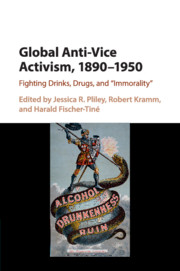Book contents
- Frontmatter
- Contents
- List of figures
- List of tables
- Notes on contributors
- Acknowledgments
- 1 Introduction: a plea for a “vicious turn” in global history
- PART I HEALTH AND THE BODY
- PART II DRINKS AND DRUGS
- 5 The specter of degeneration: alcohol and race in West Africa in the early twentieth century
- 6 A question of social medicine or racial hygiene? The Bulgarian temperance discourse and eugenics in the interwar period, 1920–1940
- 7 Threats to empire: illicit distillation, venereal diseases, and colonial disorder in British West Africa, 1930–1948
- 8 Medical and criminological constructions of drug addiction in late Imperial and early Soviet Russia
- 9 Cigarette smoking in modern Buenos Aires: the sudden change in a century-old continuity
- PART III PROSTITUTION AND SEX TRAFFICKING
- Index
8 - Medical and criminological constructions of drug addiction in late Imperial and early Soviet Russia
from PART II - DRINKS AND DRUGS
Published online by Cambridge University Press: 05 July 2016
- Frontmatter
- Contents
- List of figures
- List of tables
- Notes on contributors
- Acknowledgments
- 1 Introduction: a plea for a “vicious turn” in global history
- PART I HEALTH AND THE BODY
- PART II DRINKS AND DRUGS
- 5 The specter of degeneration: alcohol and race in West Africa in the early twentieth century
- 6 A question of social medicine or racial hygiene? The Bulgarian temperance discourse and eugenics in the interwar period, 1920–1940
- 7 Threats to empire: illicit distillation, venereal diseases, and colonial disorder in British West Africa, 1930–1948
- 8 Medical and criminological constructions of drug addiction in late Imperial and early Soviet Russia
- 9 Cigarette smoking in modern Buenos Aires: the sudden change in a century-old continuity
- PART III PROSTITUTION AND SEX TRAFFICKING
- Index
Summary
In describing the medical history of her patient, a certain S.D., in the late 1920s, Russian addiction researcher Raisa Golant specifically mentioned that it was precisely after a lengthy stay in Austrian captivity that he understood that “without drugs life … makes no sense.” In the Russian context, the emergence of drug addiction as a social problem can be traced back to the period from the beginning of World War I to the end of 1920s, when medical, medical-legal and criminological texts for the first time constructed drug abuse as a delinquency and a specific social problem requiring immediate state intervention. Physicians and criminologists focused on the origins of drug use, created images of drug users, and proposed possible solutions to the problem. These mutually constitutive constructions of drug addiction as a social problem influenced practical narcotic policy and legitimized increasing government regulation. These discourses and policies reveal a surprising continuity between late Imperial and early Soviet addiction research.
Russian policy-makers drew on debates of drug use as a social problem from abroad, in particular Germany. These entanglements demonstrate some features that are specific for Eastern European constructions of the “drug addict.” Even brief analysis of Russian and German medical and criminological texts shows that there are many unexpected similarities between them. In both countries, scientists perceived drug addiction in a politicized way – as a disease closely associated with modernity and capitalism. They strongly supported government intervention and concurrently constructed larger projects of the improvement of healthcare and social change. In the German context, however, the association between drug addiction and Jews was made more explicit than in the Russian case, showing that drug use became closely associated with deviance in a particularly racialized way in Germany.
Physicians were among the most important voices in framing drug addiction as a threat to social stability during this period and their medical texts related to drug addiction showcase their emerging discourse about drugs, drug abuse, and the drug addict. Of course, the medical community was not the only professional group that engaged in the construction of drug addiction as a social problem.
- Type
- Chapter
- Information
- Global Anti-Vice Activism, 1890–1950Fighting Drinks, Drugs, and 'Immorality', pp. 179 - 202Publisher: Cambridge University PressPrint publication year: 2016
- 2
- Cited by



